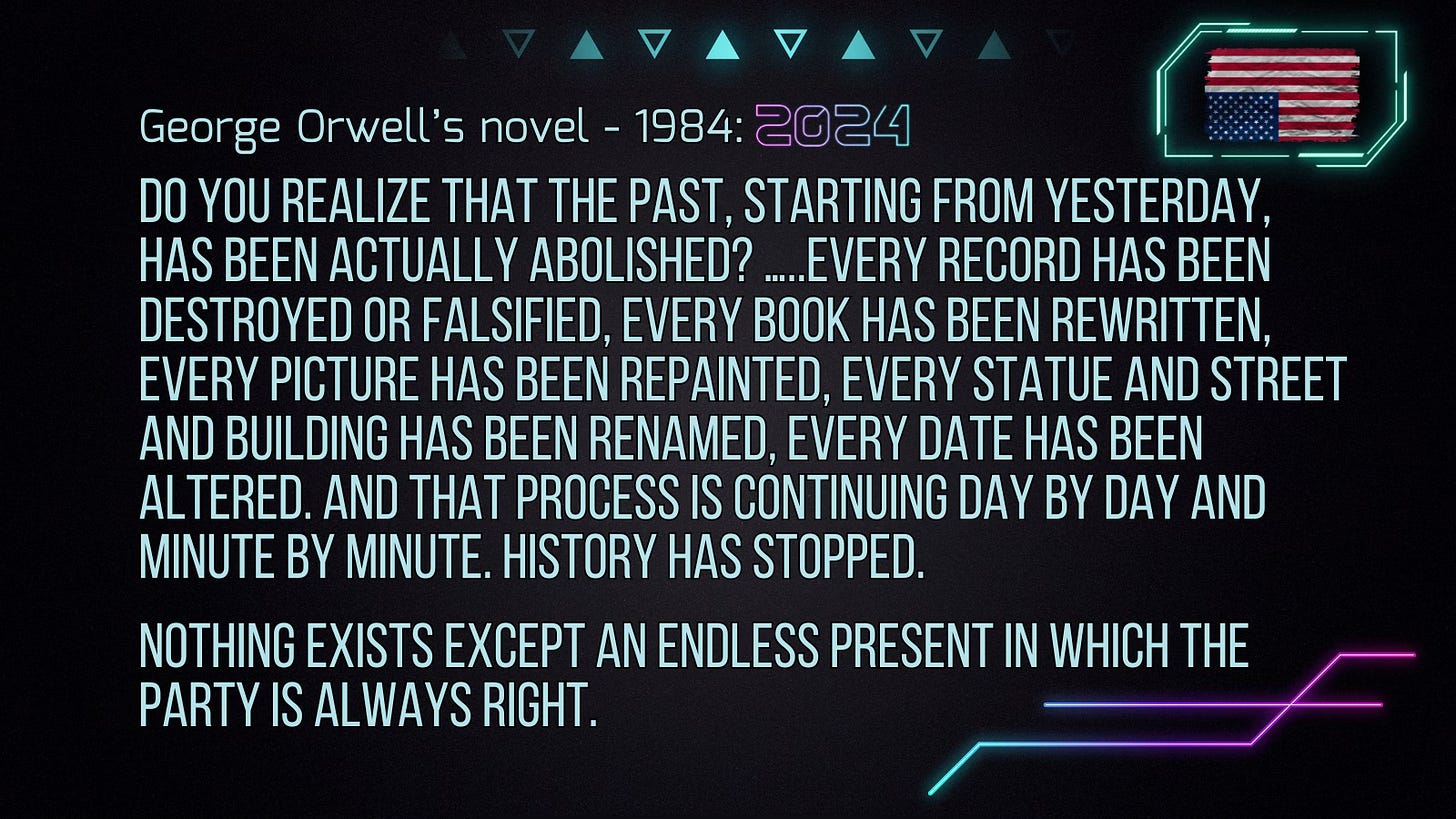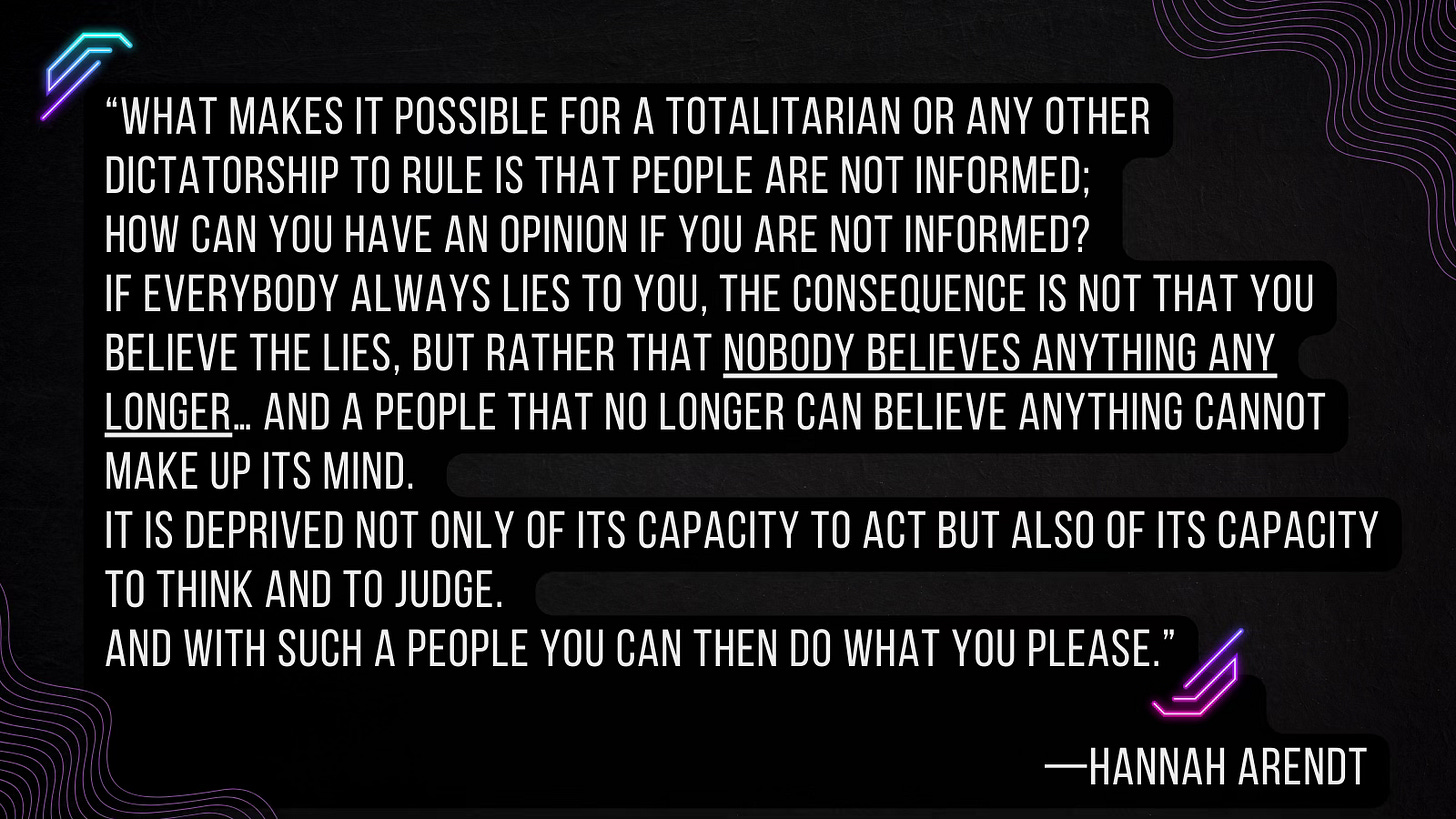'Nudging': Alice in New World Order-land
Behavioral Economics and Emotional Manipulation To Steer Humanity
“[S]hocked societies often give up things they would otherwise fiercely protect. Naomi Klein explained:
‘Fear and disorder are the catalysts for each new leap forward.’ [...] Modern life is atomised and lonely – and above all confusing. Technology and the media overwhelm us daily with sensation, emotion and information.”1
Disinformation campaigns are not intended to convince or persuade, the purpose is to create confusion. Confusion and fear, a staple of the “moanstream” media, have a debilitating effect on critical thinking.
“The C.I.A. interrogation manual also outlined what they called the ‘Alice in Wonderland’ technique of interrogation…designed ‘not only to obliterate the familiar but to replace it with the weird’; it involves asking nonsensical questions, interrupting answers with illogical follow-ups, asking two or more unrelated questions at once, and using voice tone that is entirely inappropriate for the importance of the question. This creates a strange atmosphere in which normal patterns have been replaced by ‘an eerie meaninglessness’. As the subject’s mind goes into overdrive to make sense of the nonsensical, the situation becomes ‘mentally intolerable’, and they are more likely to let their guard down.2
“Critical thinking can also be overwhelmed by emotional overload, such as extreme stress, guilt or fear. Cults encourage relentlessly critical ‘soul searching’ and ‘confession’, while political movements inculcate intense feelings of guilt around identity politics such as class or race. On re-education camps, Chairman Mao Zedong said, ‘The first method in reasoning is to give the patients a powerful stimulus, yell at them “you’re sick!”, so the patients will have a fright and break out in an over-all sweat; then, they can be carefully treated.’”3
“[T]here is no denying that Western civilisation is currently going through a crisis point. Faith in politicians, the media and other institutions is collapsing. [S]hock after shock is ostensibly weakening people’s resolve. YouGov reports that one in eight Brits now feels tired all the time.

Economic conditions have worsened in many countries. Food bank use in the UK and food pantry use in the US have increased. Hunger, stress and exhaustion are the perfect conditions for old ways of thinking to be dissolved so something new can take their place. These are the conditions that totalitarian regimes have fostered in order to implement new ideologies. China’s ‘Great Leap Forward’ agricultural reforms starved millions to death (whether deliberately or not), as the regime sought to destroy the Four Olds: old ideas, old culture, old customs and old habits. The Khmer Rouge revolutionary agricultural reforms also starved millions of Cambodians in their ‘Year Zero’ attempt to reset society. Today, our leaders in the West openly view the state of chaos as an opportunity to implant new behaviours and ideals under the banner of The Great Reset and Net Zero – as a prime candidate for the ‘shock doctrine’. Proposed digital IDs, central bank digital currencies, and environmental and social agendas wait in the wings.”4
The History, Theory, and Use of “Nudging” Society
The concept of “nudging” represents a significant shift in how societies are influenced and governed, leveraging subtle psychological and behavioral cues to steer individuals’ choices without overt coercion. It may seem harmless or even beneficial on the surface, but the history, theory, and application of nudging reveal deeper implications for autonomy, morality, and the proper role of government and institutions in a free society.
Nudging is a concept rooted in behavioral economics and popularized by Richard H. Thaler and Cass R. Sunstein in their 2008 book, Nudge: Improving Decisions about Health, Wealth, and Happiness. They define a nudge as any aspect of a decision-making context that subtly alters people’s behavior without restricting options or significantly changing incentives. For example, placing healthier foods at eye level in a cafeteria to encourage better eating habits is a nudge, whereas banning unhealthy foods outright would not qualify.5
Key to nudging is the preservation, or illusion, of choice; individuals are not forced to comply with the intended outcome, but the decision-making environment is structured to make certain choices more likely.
Intellectual Roots of Nudging:
Behavioral Psychology:
Early 20th-century psychologists like B.F. Skinner explored how environmental factors influence human behavior. Skinner’s work on operant conditioning demonstrated that behaviors could be shaped by reinforcement, paving the way for later insights into subtle behavioral manipulation.6Cognitive Psychology:
Daniel Kahneman and Amos Tversky’s groundbreaking research in the 1970s and 1980s revealed systematic biases in human decision-making. Their insights into heuristics, framing effects, and cognitive biases laid the foundation for understanding how humans often make irrational decisions.7Behavioral Economics:
Building on this work, Thaler and others began applying psychological insights to economic behavior, challenging the classical economic assumption of humans as rational actors. Nudging emerged as a practical framework for using these insights to “improve” individual and collective decision-making.
The concept of nudging gained traction among policymakers in the early 21st century. Governments and organizations began forming “nudge units,” such as the Behavioral Insights Team in the UK (established in 2010), to design policies based on behavioral insights.
Video Above: Black Rock’s Larry Fink on forcing behaviors
Key Operating Principles of Nudging:
Libertarian Paternalism:
Thaler and Sunstein advocate for a governance model that combines libertarianism (respect for individual choice) with paternalism (guiding individuals toward decisions that promote their welfare). Nudges are presented as a middle ground, preserving freedom while addressing cognitive biases that lead to suboptimal decisions.Choice Architecture:
The design of decision-making environments is central to nudging. Choice architects—whether policymakers, marketers, or organizations—create the context in which decisions are made, subtly influencing outcomes by adjusting factors such as default options, framing, and accessibility.Behavioral Biases:
Nudges exploit predictable cognitive biases, such as:Status Quo Bias: A tendency to stick with default options.
Loss Aversion: A stronger reaction to potential losses than to equivalent gains.
Anchoring: The influence of initial information on subsequent decisions.
Nudging has been applied in various domains:
Public Health:
Campaigns promoting healthy lifestyles often use nudging, such as redesigning food labels to emphasize nutritional information or using default enrollment in organ donation programs. And most assuredly, the Covid 19 debacle was the single grandest effort at nudging the world has ever seen.Finance:
Retirement savings plans often employ automatic enrollment, leveraging default bias to increase participation rates while allowing individuals to opt out.Environmental Policy:
Behavioral nudges encourage eco-friendly behaviors, such as defaulting to paperless billing or presenting energy usage comparisons with neighbors.Governance and Civic Engagement:
Governments use nudges to increase voter turnout, improve tax compliance, and enhance public safety through subtle behavioral prompts.
Video Above: Lucian Tarnowski at Davos 2024 on Systems Change of Gamification and incentivizing people into compliance. A global game for ALL and a redesign of money.
For more on this, watch Moloch Machine/Techno Salvation, below, plus, episode 1:
Obviously, It’s Unethical
Despite its popularity, nudging has drawn criticism from various quarters:
Manipulation and Autonomy:
Critics argue that nudging undermines individual autonomy by manipulating choices without full transparency. The subtlety of nudging raises ethical concerns about consent and whether individuals are aware of how their decisions are being influenced.
Moral Hazard:
The paternalistic aspect of nudging assumes that policymakers or institutions know what is best for individuals. This opens the door to subjective or ideologically driven definitions of “welfare.”
Effectiveness and Limitations:
While nudges can influence behavior, their impact is often modest and context-dependent. Relying too heavily on nudges may ignore systemic issues requiring structural solutions rather than incremental behavioral adjustments.
Political and Ideological Bias:
Choice architects inevitably embed their values into the nudges they design. This has led to concerns that nudging can become a tool for advancing specific political or ideological agendas under the guise of neutrality.8
This applies to the so-called "truth movement" too. As the psychological warfare continues in our newest landscape the threats are more real than ever. Note motives, tactics and storytelling employed by the Woke Right. As Michael O'Fallon wrote: “Prominent figures such as Tucker Carlson and Stephen Wolfe, are some of those who most significantly influence unsuspecting conservatives by infusing a critical consciousness in their minds while simultaneously deconstructing history—just like the Woke Left.” Be mindful of how there is a continual sinister operation to polarize our society to "nudge" us into a new center... to deconstruct our morals, values, traditions, history, constitution - Western heritage - in order to nudge us toward the Great Reset. - Summer
The Christian Worldview and Nudging (Manipulation)
From a Christian perspective, the nudging tactic is clearly deceptive and violates the sanctity of human agency, individual freedom, and moral responsibility when individuals are subtly manipulated rather than reasoned with openly. (Deuteronomy 30:19; Joshua 24:15)
At its core, nudging assumes a secular anthropology, that humans are irrational beings needing external (human, ruling class) guidance to make “better” choices.
Nudging also reflects a utilitarian ethic or subversive pragmatism that prioritizes outcomes over moral principles in opposition to the biblical emphasis on truth and integrity. (Proverbs 3:3-4)9
In contrast, the Christian worldview recognizes the inherent dignity of being created in God’s image, and that every person is capable of rational thought but fallen and in need of redemption available in Christ alone. Leaders and public persuasion, particularly influencing behavior on a mass scale must be grounded in the eternal principles of truth, transparency, and respect for individual moral responsibility found in God’s word.
Faith is Resistance!
About the Authors of this article: https://armoroftruth.substack.com/about
Read daily notes + newsfeed from Armor of Truth: https://substack.com/@armoroftruth/notes
Sources:
Dodsworth, Laura, and Patrick Fagan. Free your mind: The new world of manipulation and how to resist it. London: HarperCollins Publishers, 2024. Page 167.
Ibid. Page 161.
Ibid. Page 163.
Ibid. Page 168-169.
Thaler, Richard H., and Cass R. Sunstein. Nudge: Improving Decisions about Health, Wealth, and Happiness. New Haven: Yale University Press, 2008.
Skinner, B.F. Science and Human Behavior. New York: Macmillan, 1953.
Kahneman, Daniel. Thinking, Fast and Slow. New York: Farrar, Straus and Giroux, 2011.
Reiff, Philip. The Triumph of the Therapeutic: Uses of Faith after Freud. New York: Harper & Row, 1966.
All Scripture verses, Proverbs 3:4-6; Deuteronomy 30:19; Joshua 24:15. Holy Bible, English Standard Version.
Links To Articles:
* 2021 Edelman Trust Barometer: www.edelman.com/sites/g/files/aatuss191/files/2021-06/2021%20Edelman%20Trust%20Barometer%20Specl%20Report%20Trust%20The%20New%20Brand%20Equity.pdf
** YOUGOV.org One in Eight Britons Feel Tired All The Time. https://yougov.co.uk/society/articles/40047-one-eight-britons-feel-tired-all-time
*** EDGE Serpentine Gallery-MAPS FOR THE 21ST CENTURY. https://web.archive.org/web/20170712003137/https://www.edge.org/event/edge-serpentine-gallery-maps-for-the-21st-century
You might also like to read:
A Communist Manifesto for Christian Nationalists: Testing the Woke Right
LINK: https://newdiscourses.com/2024/12/a-communist-manifesto-for-christian-nationalists-testing-the-woke-right/
Download the Armor of Truth Mobile App Free
NEW! AoT Locals
NEW! AoT Telegram
Armor of Truth, Inc is a 501(c)(3) Non Profit Organization
Donations are tax deductible
By supporting Armor of Truth you are helping to reach thousands of people daily with the Gospel of Jesus Christ and encouragement to persevere in a world that is hostile to the gospel. Please consider making a donation to help support this mission.
Support Armor of Truth, official donation page: Donate
CashApp $aotmin



















